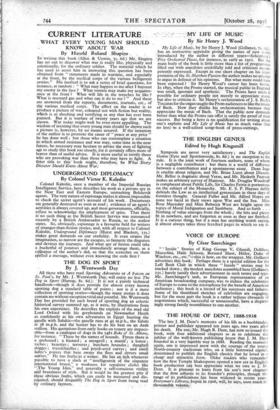Colonel Kaledin, once a member 'of the Imperial Russian Intelligence
Service, here describes his work as a private spy in the Near East and Eastern Europe, unmasking Bolshevik agents. The very nature of espionage makes it almost impossible to check the secret agent's account of his work. Documents are generally destroyed as soon as read ; evidence of an agent's activities is always covered up, and most goVernments, officially, refuse to acknowledge the employment of spies. That there: is' no such thing as the British Secret Service was announced recently by a British Ambassador to Russia, so the Author states. So, obviously, espionage is a favourite field for writers of stranger-than-fiction stories, and, with all respect to Colonel Kaledin, Underground Diplomacy (Hurst and Blacken, " iss.) Makes great demands on our credulity. It 'even strains the imagination, so narrow are the escapes, so fantastic the disguises and devious the journeys. And what spy of fiction could take a ;bucketful of potatoes and immediately arrange them, as a colleague of the author's did, so that the scratches on them spelled a message, without even knowing the code first ?
























































 Previous page
Previous page